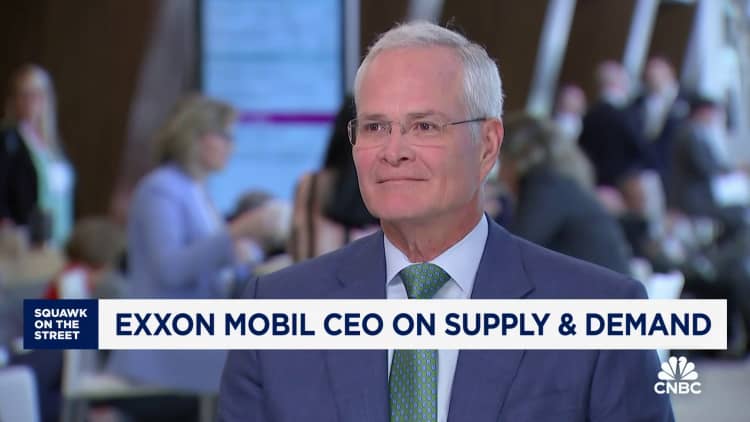- Exxon CEO Darren Woods said the oil major is not trying to acquire Hess Corp. in its dispute with Chevron over assets in Guyana.
- Chevron has a pending $53 billion deal to acquire Hess.
- Exxon is claiming a right of first refusal over Hess’ Guyana assets under a joint operating agreement that governs a massive block of offshore resources.
HOUSTON — Exxon is not trying to acquire Hess as the oil major battles with Chevron over lucrative oil assets in Guyana, CEO Darren Woods said Monday.
When asked directly, Woods told the CERAWeek by S&P Global energy conference that acquiring Hess is not one of Exxon’s objectives in the dispute with Chevron. Exxon would not have waited for Chevron to announce its deal if the company were interested in purchasing Hess, the CEO said during the interview.
Chevron’s pending $53 billion acquisition of Hess is largely a play to gain a foothold in Guyana’s massive oil assets. Exxon is claiming a right of first refusal over Hess’ Guyana assets under a joint operating agreement that governs the Stabroek oil block, which is estimated to have 11 billion barrels of oil and gas.
Exxon controls 45% of the Stabroek block, while Hess has a 30% stake. The China National Offshore Oil Corporation, or CNOOC, controls the remaining 25%.
Exxon escalated the dispute with Chevron by seeking arbitration at the International Chamber of Commerce in Paris earlier this month. Chevron rejects Exxon’s claim to a right of first refusal, but has told investors in financial filings that its deal with Hess would not close if an arbitration court rules in its competitors’ favor.
“We want to make sure the rights afford to us under the JOA are recognized and conformed with,” Woods told CNBC’s “Squawk on the Street” in a separate interview at CERAWeek. Woods said Exxon is also trying to find out how much value Chevron’s deal is placing on Hess’ Guyana assets.
“It gives us the opportunity to … make sure that we’re making a decision that’s in the best interest of the company and the shareholders,” Woods said.
Exxon wrote the joint operating agreement that governs the Stabroek block, Woods said. “We’re pretty familiar with the intent and objectives and language of that document.”








